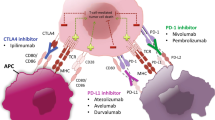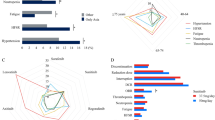Abstract
Purpose
Sunitinib is an oral tyrosine kinase inhibitor approved for the treatment of metastatic renal cell carcinoma (mRCC). High variability in pharmacokinetics coupled with a proven exposure–effect relationship makes sunitinib an ideal candidate for therapeutic drug monitoring (TDM). The feasibility of TDM of sunitinib in patients with mRCC was evaluated in this prospective observational study in a real-world scenario.
Methods
Seventy patients with mRCC treated with sunitinib at a fixed dose of 50 mg per day were enrolled in the study. Total trough plasma level (TTL) of sunitinib (sunitinib and its active metabolite, SU12662), was measured between days 14/15 of cycle 1. The discriminatory potential of TTL of sunitinib for the prediction of responders and occurrence of grade ≥ 3 toxicity was determined using receiver operating characteristic (ROC) curve.
Results
The median TTL of sunitinib was 76 ng/mL. Forty six out of 70 patients were evaluable for response, whereas 60 out of 70 patients were evaluable for toxicity. Threshold concentrations obtained from ROC analysis showed that TTL of 60.75 ng/mL and 82.3 ng/mL was discriminatory for response and occurrence of grade ≥ 3 toxicity respectively. 31/34 (91.7%) patients having TTL ≥ 60.75 ng/mL responded to treatment, while only 5/12 (41.6%) responded when TTL was < 60.75 ng/mL (P = 0.001). On the other hand, the incidence of grade ≥ 3 toxicity was 9/24 (37.7%) in patients with TTL ≥ 82.3 ng/mL compared to 4/36 (11.1%) in patients with TTL < 82.3 ng/mL (P = 0.024).
Conclusion
The TTL range of 60.75–82.3 ng/mL was found to be optimal in terms of safety and efficacy. More than 50% of patients in our cohort attained TTL of sunitinib outside the optimal range, thus demonstrating the feasibility of TDM to improve safety and efficacy of sunitinib in mRCC.






Similar content being viewed by others
Availability of data and material
All data generated and analysed during this study are available from the corresponding author on reasonable request.
Code availability
Not Applicable.
References
Blumenthal GM, Cortazar P, Zhang JJ et al (2012) FDA approval summary: sunitinib for the treatment of progressive well-differentiated locally advanced or metastatic pancreatic neuroendocrine tumors. Oncologist 17:1108–1113. https://doi.org/10.1634/THEONCOLOGIST.2012-0044
Goodman VL, Rock EP, Dagher R et al (2007) Approval summary: sunitinib for the treatment of imatinib refractory or intolerant gastrointestinal stromal tumors and advanced renal cell carcinoma. Clin Cancer Res 13:1367–1373. https://doi.org/10.1158/1078-0432.CCR-06-2328
Bracarda S, Iacovelli R, Boni L et al (2016) Sunitinib administered on 2/1 schedule in patients with metastatic renal cell carcinoma: the RAINBOW analysis. Ann Oncol Off J Eur Soc Med Oncol 27:366. https://doi.org/10.1093/annonc/mdv589
Lee JL, Kim MK, Park I et al (2015) RandomizEd phase II trial of Sunitinib four weeks on and two weeks off versus two weeks on and one week off in metastatic clear-cell type renal cell carcinoma: RESTORE trial. Ann Oncol 26:2300–2305. https://doi.org/10.1093/annonc/mdv357
Deng H, Li M, Wu Q et al (2020) A 2/1 sunitinib dosing schedule provides superior antitumor effectiveness and less toxicity than a 4/2 schedule for metastatic renal cell carcinoma: a systematic review and meta-analysis. Front Oncol. https://doi.org/10.3389/FONC.2020.00313/REFERENCE
Faivre S, Delbaldo C, Vera K et al (2006) Safety, pharmacokinetic, and antitumor activity of SU11248, a novel oral multitarget tyrosine kinase inhibitor, in patients with cancer. J Clin Oncol 24:25–35. https://doi.org/10.1200/JCO.2005.02.2194
Cella D, Kaiser K, Beaumont J, et al (2012) Quality of life (QOL) among renal cell carcinoma (RCC) patients in a randomized double blind cross-over patient preference study of pazopanib (P) versus sunitinib (S). Ann Oncol 23:ix261–ix262. https://doi.org/10.1016/s0923-7534(20)33447-5
Noda S, Otsuji T, Baba M et al (2015) Assessment of sunitinib-induced toxicities and clinical outcomes based on therapeutic drug monitoring of sunitinib for patients with renal cell carcinoma. Clin Genitourin Cancer 13:350–358. https://doi.org/10.1016/J.CLGC.2015.01.007
Houk BE, Bello CL, Poland B et al (2010) Relationship between exposure to sunitinib and efficacy and tolerability endpoints in patients with cancer: results of a pharmacokinetic/pharmacodynamic meta-analysis. Cancer Chemother Pharmacol 66:357–371. https://doi.org/10.1007/S00280-009-1170-Y
Demlová R, Turjap M, Peš O et al (2020) Therapeutic drug monitoring of sunitinib in gastrointestinal stromal tumors and metastatic renal cell carcinoma in adults—a review. Ther Drug Monit 42:20–32. https://doi.org/10.1097/FTD.0000000000000663
Lankheet NAG, Knapen LM, Schellens JHM et al (2014) Plasma concentrations of tyrosine kinase inhibitors imatinib, erlotinib, and sunitinib in routine clinical outpatient cancer care. Ther Drug Monit 36:326–334. https://doi.org/10.1097/FTD.0000000000000004
George S, Blay JY, Casali PG et al (2009) Clinical evaluation of continuous daily dosing of sunitinib malate in patients with advanced gastrointestinal stromal tumour after imatinib failure. Eur J Cancer 45:1959–1968. https://doi.org/10.1016/J.EJCA.2009.02.011
Krishna VM, Noronha V, Prabhash K et al (2013) Sunitinib in metastatic renal cell carcimoma: a single-center experience. Indian J Cancer 50:268–273. https://doi.org/10.4103/0019-509X.118725
Gurjar M, Mehta P, Sharma J et al (2020) An HPLC method for simultaneous quantification of sunitinib and its active metabolite, SU12662, using hydrophilic interaction chromatography principle. Bioanalysis 12:75–85. https://doi.org/10.4155/BIO-2019-0188
Eisenhauer EA, Therasse P, Bogaerts J et al (2009) New response evaluation criteria in solid tumours: revised RECIST guideline (version 1.1). Eur J Cancer 45:228–247. https://doi.org/10.1016/J.EJCA.2008.10.026
Schnadig ID, Hutson TE, Chung H et al (2014) Dosing patterns, toxicity, and outcomes in patients treated with first-line sunitinib for advanced renal cell carcinoma in community-based practices. Clin Genitourin Cancer 12:413–421. https://doi.org/10.1016/J.CLGC.2014.06.015
Ravaud A, Bello CL (2011) Exposure-response relationships in patients with metastatic renal cell carcinoma receiving sunitinib: maintaining optimum efficacy in clinical practice. Anticancer Drugs 22:377–383. https://doi.org/10.1097/CAD.0B013E3283442039
Mendel DB, Douglas Laird A, Xin X, et al (2003) In vivo antitumor activity of SU11248, a novel tyrosine kinase inhibitor targeting vascular endothelial growth factor and platelet-derived growth factor receptors: determination of a pharmacokinetic/pharmacodynamic relationship.
Uemura H, Shinohara N, Yuasa T et al (2010) A phase II study of sunitinib in Japanese patients with metastatic renal cell carcinoma: insights into the treatment, efficacy and safety. Jpn J Clin Oncol 40:194–202. https://doi.org/10.1093/JJCO/HYP146
Takasaki S, Kawasaki Y, Kikuchi M et al (2018) Relationships between sunitinib plasma concentration and clinical outcomes in Japanese patients with metastatic renal cell carcinoma. Int J Clin Oncol 235(23):936–943. https://doi.org/10.1007/S10147-018-1302-7
Zhang AY, Fox P, Coulter S, et al (2014) Effect of toxicity-adjusted dose (TAD) of sunitinib on intra-patient variation of trough levels: a longitudinal study in metastatic renal cell cancer (mRCC) 32:2597–2597. https://doi.org/10.1200/JCO.2014.32.15_SUPPL.2597
Verheijen RB, Yu H, Schellens JHM et al (2017) Practical recommendations for therapeutic drug monitoring of kinase inhibitors in oncology. Clin Pharmacol Ther 102:765–776. https://doi.org/10.1002/CPT.787
Acknowledgements
The authors gratefully acknowledge the Indian Council of Medical Research for partially funding this study through the Centre for Advanced Research and Excellence (ICMR-CARE) in Clinical Pharmacology (Grant No. 55/4/13/CARE-CP/2018-NCD-II). The authors acknowledge Mr. Sharath Kumar HJ for extending his help in making figures.
Funding
This work was supported by the Indian Council of Medical Research for partially funding this study through the Centre for Advanced Research and Excellence (ICMR-CARE) in Clinical Pharmacology (Grant No. 55/4/13/CARE-CP/2018-NCD-II).
Author information
Authors and Affiliations
Contributions
Vikram Gota and Amit Joshi contributed to the study conception and design. Material preparation and data collection performed by Khushboo A. Gandhi, Amit Joshi, Parsshava Mehta, Jyoti Sharma, Manjunath Nookala, Vanita Noronha, Kumar Prabhash, Vikram Gota. Bioanalysis of samples were performed by Murari Gurjar and Anand Patil. Statstical analysis was performed by Pallavi Rane. The first draft of the manuscript was written by Khushboo Gandhi and was edited and reviewed by Vikram Gota and all authors commented on previous versions of the manuscript.
Corresponding author
Ethics declarations
Conflict of interest
The authors declare that they have no conflict of interest.
Ethics approval
All procedures performed in studies involving human participants were in accordance with the ethical standards of the institutional and/or national research committee (TMC-ACTREC IEC-III, Registration number: ECR/149/Inst/MH/2013) and with the 1964 Helsinki Declaration and its later amendments or comparable ethical standards.
Consent to participate
Written informed consent to participate in the study was obtained from all participants.
Additional information
Publisher's Note
Springer Nature remains neutral with regard to jurisdictional claims in published maps and institutional affiliations.
Supplementary Information
Below is the link to the electronic supplementary material.
Rights and permissions
About this article
Cite this article
Gandhi, K.A., Joshi, A., Mehta, P. et al. Feasibility of therapeutic drug monitoring of sunitinib and its implications on response and toxicity in patients with metastatic renal cell cancer. Cancer Chemother Pharmacol 89, 751–759 (2022). https://doi.org/10.1007/s00280-022-04432-4
Received:
Accepted:
Published:
Issue Date:
DOI: https://doi.org/10.1007/s00280-022-04432-4




